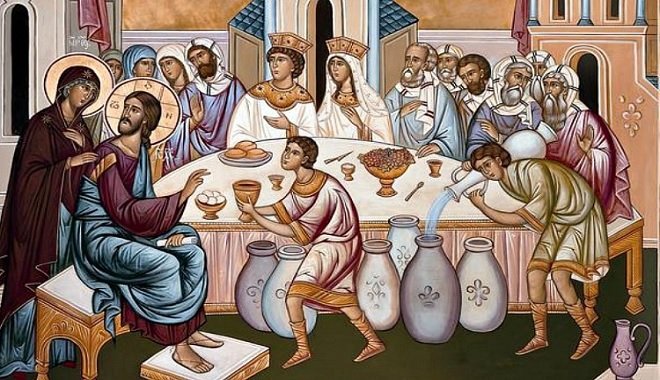
Giving Our Best Effort and Trusting in God’s Miracle:
In every aspect of life, whether personal or professional, we are called to give our best effort. This principle is beautifully illustrated in the story of the Wedding at Cana, where Jesus performed His first miracle. This biblical event teaches us that when we do our part with dedication and sincerity, God can transform our efforts into something extraordinary.
The Wedding at Cana: Doing Our Part and Trusting in God
In John 2:1-11, we find the account of Jesus’ first public miracle at the Wedding at Cana. The celebration was in full swing when disaster struck—the wine ran out, a significant embarrassment for the hosts. At this moment, the Blessed Virgin Mary, noticing the problem, approached Jesus and simply said, "They have no wine." Although Jesus initially responded, "My hour has not yet come," Mary turned to the servants and instructed them, "Do whatever he tells you."
Jesus then told the servants, “Fill the jars with water” (John 2:7, ESV-CE). The text specifically notes that "they filled them to the brim". This detail is significant because the servants could have filled the jars halfway or nearly full, but they chose to fill them completely, demonstrating full obedience and effort. This act symbolizes their total commitment and giving their best. It wasn’t merely an action; it was an expression of faith and trust. They didn’t do a partial job; they gave their all, trusting that Jesus would handle the rest.
Once the jars were filled, Jesus performed the miracle, turning the water into wine, and not just any wine, but the finest wine served at the wedding. This miraculous transformation demonstrates how Jesus can take our fullest efforts and turn them into something extraordinary, something beyond our imagination.
The Importance of Giving Our Best Effort
The Wedding at Cana teaches us a profound lesson: we are called to do our part—our very best—and then trust in God to do His. This principle resonates throughout Scripture and the teachings of the Church. St. Paul, in his letter to the Colossians, reminds us, "Whatever you do, work heartily, as for the Lord and not for men" (Colossians 3:23, ESV-CE).
At Eloit, where Jesus has appointed me as co-founder and CEO, this verse serves as a guiding principle in our work culture. We approach every task with full commitment, seeing our work as a service to God rather than merely to each other or our clients. This mindset drives us to pursue excellence, ensuring that our efforts meet the highest standards, knowing that God will bless and perfect our work.
Divine Intervention: God Multiplies Our Efforts
The Catechism of the Catholic Church (CCC) teaches us that God invites us to participate in His divine work. While our efforts alone may be limited, when we offer them to God, He can multiply them beyond our imagination. As Jesus said in Matthew 17:20, "For truly, I say to you, if you have faith like a grain of mustard seed, you will say to this mountain, 'Move from here to there,' and it will move, and nothing will be impossible for you."
The saints understood this truth well. St. John Paul II once remarked, "Faith and reason are like two wings on which the human spirit rises to the contemplation of truth." Our reason guides us to put in the effort, while faith helps us trust in God's power to bring forth the fruit of our labour.
At Eloit, our trust in the Lord and commitment to excellence have led to success across all our endeavours - winning awards, achieving high client satisfaction, and earning referrals for Edisapp School Software and other services. All glory to Jesus Christ, our Founder, who perfects our efforts according to His divine will.
Similarly, with BibleOn, we offer our best efforts, fully trusting Jesus to perfect them, ensuring His Word reaches the ends of the earth in the most perfect and impactful way possible, transforming lives through His divine power and guidance.
The Call to Perfection in All We Do
In Matthew 5:48 (ESV-CE), Jesus exhorts us: "You therefore must be perfect, as your heavenly Father is perfect." This verse is a reminder that we are called to strive for perfection in all our deeds, responsibilities, and tasks—whether in our work, our family life, our service to the Church, or even in small acts of kindness. This pursuit of perfection is not about being flawless but about giving our best effort, striving to reflect the love and excellence of God in all we do.
Furthermore, in Luke 16:10 (ESV-CE), Jesus teaches, "One who is faithful in a very little is also faithful in much, and one who is dishonest in a very little is also dishonest in much." Being faithful in small things is essential because it prepares us for greater responsibilities. When we commit to excellence in the little things, God entrusts us with bigger tasks, knowing we will approach them with the same dedication and care.
The story of the Wedding at Cana, along with the teachings of Jesus and the Catholic Church, reminds us that we are called to give our best effort in all that we do. Whether facing a significant challenge or a simple daily task, we must fill our "jars" to the brim, trusting that Jesus can transform our dedication into a miracle. As we strive for perfection and remain faithful in our duties, let us remember that it is God who brings our efforts to fruition, turning water into the perfect wine in our lives.

